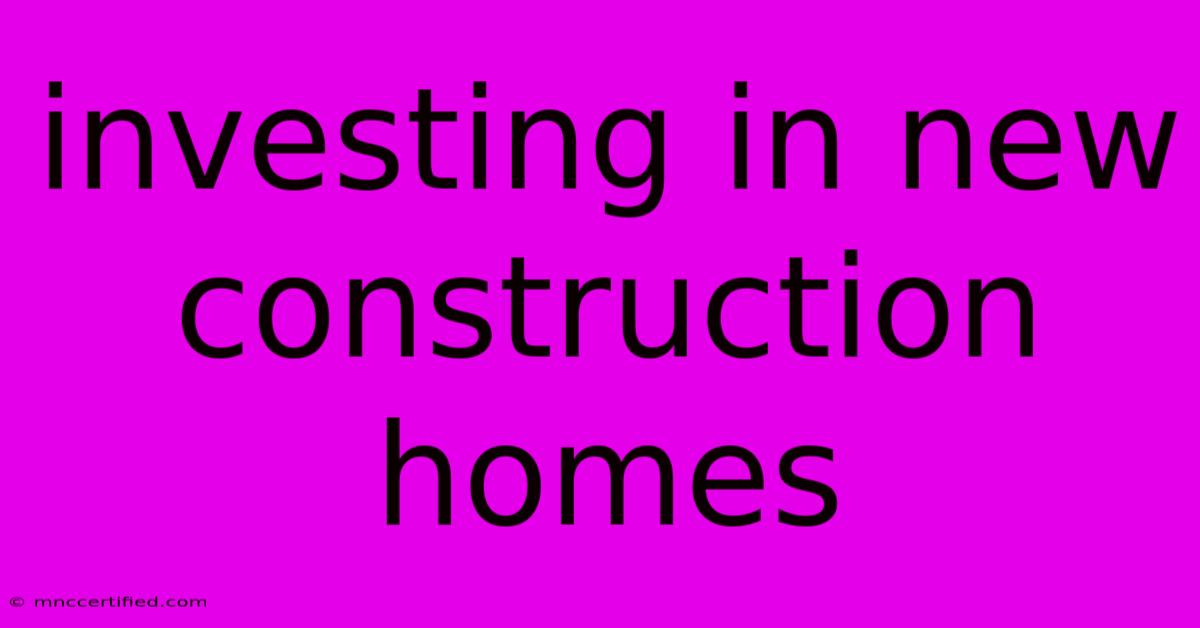Investing In New Construction Homes

Table of Contents
Investing in New Construction Homes: A Guide to Building Your Dream Home and Wealth
The dream of owning a brand-new, custom-built home is a powerful one. But beyond the excitement of choosing finishes and layouts, investing in new construction can also be a smart financial move. However, navigating the process requires careful consideration. This guide will equip you with the knowledge and tools to make an informed decision about whether investing in new construction homes is right for you.
The Pros of Investing in New Construction Homes
1. Modern Features and Energy Efficiency: New homes are built with the latest technologies and materials, offering features like open floor plans, energy-efficient appliances, and smart home integration. These advancements can translate into lower utility bills and a more comfortable living experience.
2. Customization Options: One of the biggest perks of new construction is the ability to personalize your home. You can choose everything from the exterior siding and landscaping to the cabinetry and countertops, ensuring your dream home truly reflects your style and needs.
3. Warranty and Builder Support: New homes typically come with a builder's warranty covering structural defects and major systems. This added protection provides peace of mind during the initial years of ownership and can help mitigate unexpected repair costs.
4. Potential for Appreciation: New construction homes often appreciate in value faster than older homes, especially in growing areas. This is due to factors like modern features, lower maintenance costs, and a newer, more desirable neighborhood.
5. Tax Benefits: Certain states and local governments offer tax incentives for new home construction, such as property tax breaks or rebates, making it a financially attractive option.
The Cons of Investing in New Construction Homes
1. Higher Initial Costs: While new construction might offer long-term savings, the initial investment is often higher than buying an existing home. This is due to factors like land costs, building materials, and builder fees.
2. Delays and Unexpected Costs: Construction projects can experience delays due to weather, material shortages, or unforeseen issues. These delays can lead to additional costs and stress.
3. Limited Flexibility in Location: You might not be able to find new construction in your ideal location, as builders often focus on specific areas. This can require compromise on factors like commute times or neighborhood amenities.
4. Lack of Established Neighborhood: New construction homes are often located in developing areas, meaning you might not have access to established neighborhood amenities, schools, or social networks.
Tips for Investing in New Construction Homes
1. Thorough Research: Conduct thorough research on builders, neighborhoods, and market trends before making any decisions. Read online reviews, speak to previous clients, and consult with real estate agents.
2. Secure Pre-Approval: Get a pre-approval for your mortgage loan to understand your budget and ensure you qualify for financing.
3. Understand Contract Details: Carefully review all contracts and ensure you understand the builder's warranty, payment schedules, and change order procedures.
4. Consider Location and Resale Value: Analyze the long-term potential of the neighborhood and the resale value of the home in the future.
5. Hire a Home Inspector: Even with builder warranties, it's crucial to hire an independent home inspector to assess the quality of construction and identify potential issues.
Conclusion
Investing in new construction homes can be a rewarding experience, offering a modern and personalized living space. However, it's essential to weigh the pros and cons carefully and conduct thorough research to make an informed decision. By understanding the potential benefits and challenges, you can navigate the process successfully and build your dream home and wealth.

Thank you for visiting our website wich cover about Investing In New Construction Homes. We hope the information provided has been useful to you. Feel free to contact us if you have any questions or need further assistance. See you next time and dont miss to bookmark.
Featured Posts
-
Home Insurance In Brownsville Texas
Nov 14, 2024
-
Bakery Clarifies Goldberg Cake Order Issue
Nov 14, 2024
-
John Krasinski Peoples Sexiest Man Emily Blunts Response
Nov 14, 2024
-
Trump Selects Gaetz For House Role Despite Ethics Probe
Nov 14, 2024
-
Bridget Jones Mad About The Boy Full Details
Nov 14, 2024